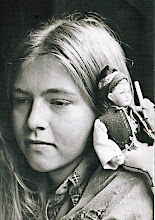Here's another card that might not make it through the mail if it were sent today. It has a little cloth bag of salt attached as a souvenir from the Great Salt Lake.
There's some very faded printing on the bag that says Great Salt Lake. The postcard photo shows people disembarking from open-air curtained train cars, with the first Saltair Pavilion in the background. The pavilion was built in 1893 and burned down in 1925. A replacement was built, but it also suffered from fire damage in 1931 and then burned down completely in 1970. Although a third pavilion was built, it was plagued by various problems, including unpredictable water levels. In a good year you might be on the edge of the water, but the next year might be a different story.
You can see by the back of the card that moisture has wicked out some of the salt.
Here's a close up of the text on the back.
The Salt Lake is also a valuable habitat for birds. Here's an earlier post on bathing at Saltair.
Wednesday, June 20, 2012
Tuesday, June 19, 2012
More from Havana, Cuba
This card showing a peaceful scene on the bay of Havana, was sent to Miss Laoma Berberich in 1920. Miss Berberich was only 7 years old then according to the Census. She later became a nurse and married Joseph Cassidy, a steelworker.
The message to Laoma reads:
Here's another view, showing the magnificent Centro Gallego, now the Grand Theater of Havana.
And here's the back of the card, with a description of the club's origins.
The message to Laoma reads:
Havana Cuba
Mar 17 1920
Just a line and just arrived this am at 6 o'clock did not enjoy the ride as much as expected the gulf was to rough could not lay in bed as the boat rocked so hard I held my own by hard work will write later
Ever Jeff
Here's another view, showing the magnificent Centro Gallego, now the Grand Theater of Havana.
And here's the back of the card, with a description of the club's origins.
Monday, June 18, 2012
Giant Maine Potato
This isn't a generic exaggeration card that could be anywhere USA. The giant spud is sitting on a classic northern Maine Bangor and Aroostook Railway car. The Bangor and Aroostook Railway (BAR) did in fact haul potatoes (in heated boxcars, no less) and at one time owed half of their annual revenue to transporting the tasty tuber.
The card was sent to Henry Fray in Seattle in 1910 from J.M.W. in Limestone, Maine. The message is a little hard to read, but here's what I could get from it (Note: Bsh indicates bushels). I love that it's a card sent by a Maine potato farmer:
Even though the initials J.M.W. would not appear to provide a lot of information, Limestone is a pretty small place and there were only so many potato farmers. I believe that this card was written by J.M. Ward. In a 1916 publication on agricultural economics, J.M. Ward details the equipment needed for his potato farm.

Here's a great photo from Wikipedia, showing a potato caretaker's card. Because potatoes were so important, men were hired to take care of them on the trains and make sure the proper temperature was maintained in the cars. The pass allowed the 'potato caretakers' free train travel back home.
The card was sent to Henry Fray in Seattle in 1910 from J.M.W. in Limestone, Maine. The message is a little hard to read, but here's what I could get from it (Note: Bsh indicates bushels). I love that it's a card sent by a Maine potato farmer:
Dear Fray we are all done digging spuds raised 5300. Bsh like the chap on the other side here at the home farm and 4000. Bsh on the farm that Ben is on. I am still making starch will probably be at it three weeks more. Wish I could come and make you a visit there. All well. J.M.W.
Even though the initials J.M.W. would not appear to provide a lot of information, Limestone is a pretty small place and there were only so many potato farmers. I believe that this card was written by J.M. Ward. In a 1916 publication on agricultural economics, J.M. Ward details the equipment needed for his potato farm.
Here's a great photo from Wikipedia, showing a potato caretaker's card. Because potatoes were so important, men were hired to take care of them on the trains and make sure the proper temperature was maintained in the cars. The pass allowed the 'potato caretakers' free train travel back home.
Subscribe to:
Comments (Atom)
























